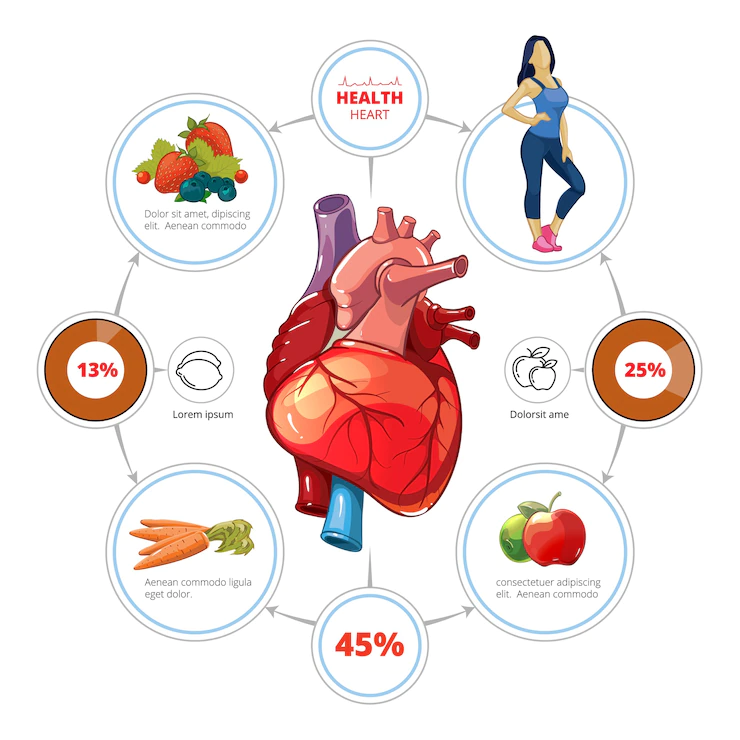 August 20, 2022
August 20, 2022
There is no better time than today to begin your journey towards a healthier lifestyle. You can make good health-conscious decisions- not just those that are good for your general well-being but also those that are good for your heart.
You need to value a heart-friendly lifestyle, figure out what works for you, and understand how to balance it with other health-related factors like food and fitness. Here are Seven Smart Decisions to lead a heart-friendly lifestyle. Let's keep a score of a health heart.
1. Heart-Friendly Diet Plan
You can start by calculating the daily calorie intake necessary to maintain an ideal weight. The technique of calculating calorie consumption not only helps in monitoring your weight but also aids in deciding on a healthy diet.
For starters, a healthy heart-friendly diet includes:
Apart from following a healthy diet, you should avoid food items high in calories and nutrients- reduce your intake of sweets, limit beverages with added sugar, and stay away from processed foods.
2. Exercise
The American Heart Association recommends regular physical exercise- a minimum of 30 minutes of moderate exercise per day, or 15-20 minutes of strenuous exercise per day, or a combination of the two, to improve heart health. Additionally, it helps in lowering cholesterol and blood pressure.
You can enhance your health by walking, running, swimming, or riding a bike. These will not only improve your metabolism but also help in your mental health.
However, before putting on your running shoes, get a go-ahead signal from your doctor.
3. Quit Smoking
If you smoke, you might want to stop.
Smoking damages the heart in numerous ways. It harms your blood vessels and blocks the flow of oxygen-rich blood to your bodily systems. Therefore, it is a significant risk factor that can lead to a heart attack or stroke.
If you have trouble quitting smoking, consult your doctor, he might be able to help you with various techniques and medicines.
4. Shed That Extra Kilos
If you are overweight, the risk of developing heart disease rises because your heart has to work extra hard. Furthermore, high blood sugar, high cholesterol, and high blood pressure lift the level of risk.
However, you can sustain an ideal weight by adopting a healthy diet and following an exercise routine.
5. Keep an Eye On your Cholesterol and Blood Pressure
Your heart and blood arteries are under additional strain if you have elevated blood pressure or hypertension. Moreover, low-density lipoprotein (LDL), the "bad" cholesterol, raises your risk for heart disease.
It is advisable to replace butter and palm oil with olive, soybean, or sunflower oil.
And completely avoid trans-fat.
6. Don’t Stress
Beyond everything else, you gain a lot of advantages from maintaining a positive attitude. Implementing and upholding routines that foster positivity can significantly improve mental health and reduce stress.
Those who have experienced an episode of a heart attack may have fear and anxiety. As a result of these emotions, their recovery may become more challenging. In such a scenario, a positive mindset steps up the recovery process and significantly lowers their stress level.
You can seek encouragement from your family and friends when the path to recovery gets tough
7. Regular Health check-ups
The best step in managing heart disease is understanding the trigger points. And what's more important is maintaining peace of mind in the face of risk factors. Regular health checkups specifically aimed at heart health can be recommended by your cardiologist and can reassure you.
If you experience any symptoms related to heart conditions, don't delay consulting your doctor. Receiving the proper medical treatment and care is the only way to steer clear of any related medical complications.
For consultation and assistance, you can reach us at www.ssbhealthcare.com
To book an appointment, contact us at +91-9540 114 114.
2026 © SSB Heart and Multispecialty Hospital.